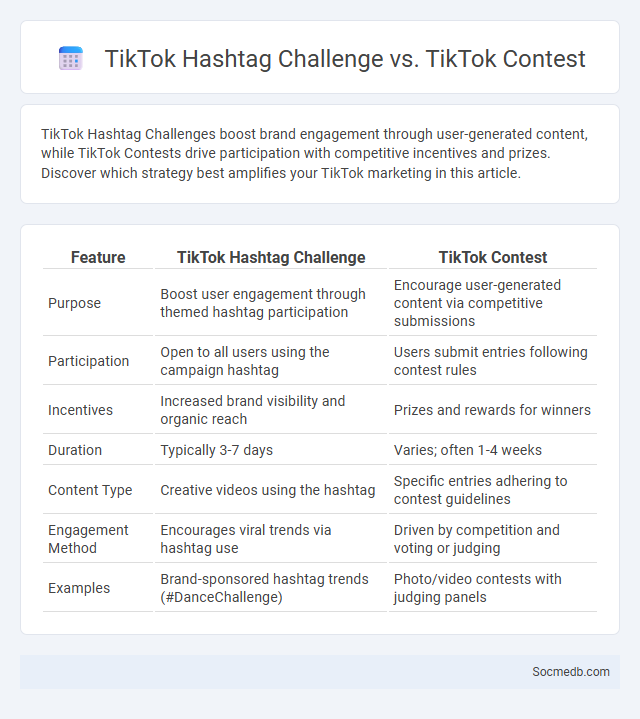
Photo illustration: TikTok Hashtag Challenge vs TikTok Contest
TikTok Hashtag Challenges boost brand engagement through user-generated content, while TikTok Contests drive participation with competitive incentives and prizes. Discover which strategy best amplifies your TikTok marketing in this article.
Table of Comparison
| Feature | TikTok Hashtag Challenge | TikTok Contest |
|---|---|---|
| Purpose | Boost user engagement through themed hashtag participation | Encourage user-generated content via competitive submissions |
| Participation | Open to all users using the campaign hashtag | Users submit entries following contest rules |
| Incentives | Increased brand visibility and organic reach | Prizes and rewards for winners |
| Duration | Typically 3-7 days | Varies; often 1-4 weeks |
| Content Type | Creative videos using the hashtag | Specific entries adhering to contest guidelines |
| Engagement Method | Encourages viral trends via hashtag use | Driven by competition and voting or judging |
| Examples | Brand-sponsored hashtag trends (#DanceChallenge) | Photo/video contests with judging panels |
Understanding TikTok Hashtag Challenges
TikTok hashtag challenges are viral trends that encourage users to create and share content around a specific theme or activity, boosting engagement and visibility. Understanding how these challenges work can help you leverage popular hashtags to increase your reach and connect with a larger audience. Participating in relevant TikTok hashtag challenges enhances your profile's discoverability by tapping into trending topics and user-generated content.
What Is a TikTok Contest?
A TikTok contest is a promotional campaign where users create and share videos based on specific themes or challenges to win prizes or gain recognition. These contests leverage TikTok's algorithm and user engagement features, such as hashtags and duets, to maximize participation and virality. Brands and influencers use TikTok contests to increase visibility, build community, and boost user-generated content effectively.
Hashtag Challenge Explained: Beyond TikTok
Hashtag challenges leverage user-generated content to foster viral engagement across multiple social media platforms such as Instagram, Twitter, and Snapchat. Brands and creators initiate these challenges by promoting a unique hashtag, encouraging widespread participation and community building centered on specific themes or goals. This marketing strategy boosts visibility, enhances audience interaction, and drives organic growth beyond TikTok's ecosystem.
Key Differences: TikTok Hashtag Challenge vs Contest
TikTok Hashtag Challenges encourage user participation by inviting users to create content around a specific theme, boosting organic reach through viral trends and community engagement. Contests on TikTok often require users to submit entries with specific rules, aiming for prize incentives that increase direct user interaction but may limit spontaneous creativity. Hashtag Challenges leverage TikTok's algorithm for widespread visibility, while Contests focus on rewarding participation and driving targeted audience engagement.
Viral Potential: Which Performs Better?
TikTok consistently outperforms other platforms in viral potential due to its algorithm prioritizing content discovery over follower count, leading to widespread reach even for new users. Instagram's Reels also show significant viral capacity, leveraging a blend of visual appeal and influencer-driven trends. Twitter, while effective for rapid information spread, typically generates viral content within niche communities rather than broad mainstream audiences.
Participant Engagement: Challenge vs Contest
Participant engagement in social media challenges typically revolves around creativity and personal expression, encouraging users to generate unique content aligned with a specific theme. Contests, on the other hand, focus on competition and reward, motivating participants through prizes and recognition for achieving set criteria or outperforming others. Both strategies leverage user interaction but differ in driving motivation: challenges cultivate community and creativity, while contests emphasize winning and performance metrics.
Brand Promotion Strategies Using Hashtags
Hashtags enhance brand visibility by categorizing content and boosting discoverability across social media platforms like Instagram, Twitter, and TikTok, driving targeted audience engagement. Effective brand promotion strategies use trending, branded, and niche-specific hashtags to increase reach while fostering community building and user-generated content. Monitoring hashtag performance with analytics tools allows brands to refine campaigns and maximize ROI in competitive digital markets.
Best Practices for Running TikTok Hashtag Challenges
To maximize engagement with TikTok hashtag challenges, create catchy, easy-to-understand hashtags that encourage participation and align with trending topics. Your content should inspire creativity and include clear instructions, making it simple for users to join and share their videos. Monitoring challenge performance through TikTok analytics helps refine strategies, ensuring your campaign remains relevant and impactful.
Legal Considerations: Contests vs Challenges
Legal considerations in social media contests versus challenges differ significantly, with contests often requiring strict adherence to state and federal regulations such as no-purchase-necessary clauses and clear prize disclosures. Challenges, typically user-generated campaigns, must navigate intellectual property rights and user consent to avoid liability for content infringement or privacy violations. Ensuring compliance with platform-specific rules and advertising standards is essential to mitigate legal risks and maintain brand integrity.
Choosing the Right Campaign Type for Your Goals
Selecting the appropriate social media campaign type depends on specific marketing objectives such as brand awareness, lead generation, or customer engagement. Platforms like Facebook, Instagram, LinkedIn, and Twitter offer diverse campaign formats including video ads, carousel posts, and sponsored content tailored to these goals. Analyzing key performance indicators (KPIs) such as reach, click-through rates, and conversion metrics ensures alignment between campaign choice and desired outcomes.
 socmedb.com
socmedb.com